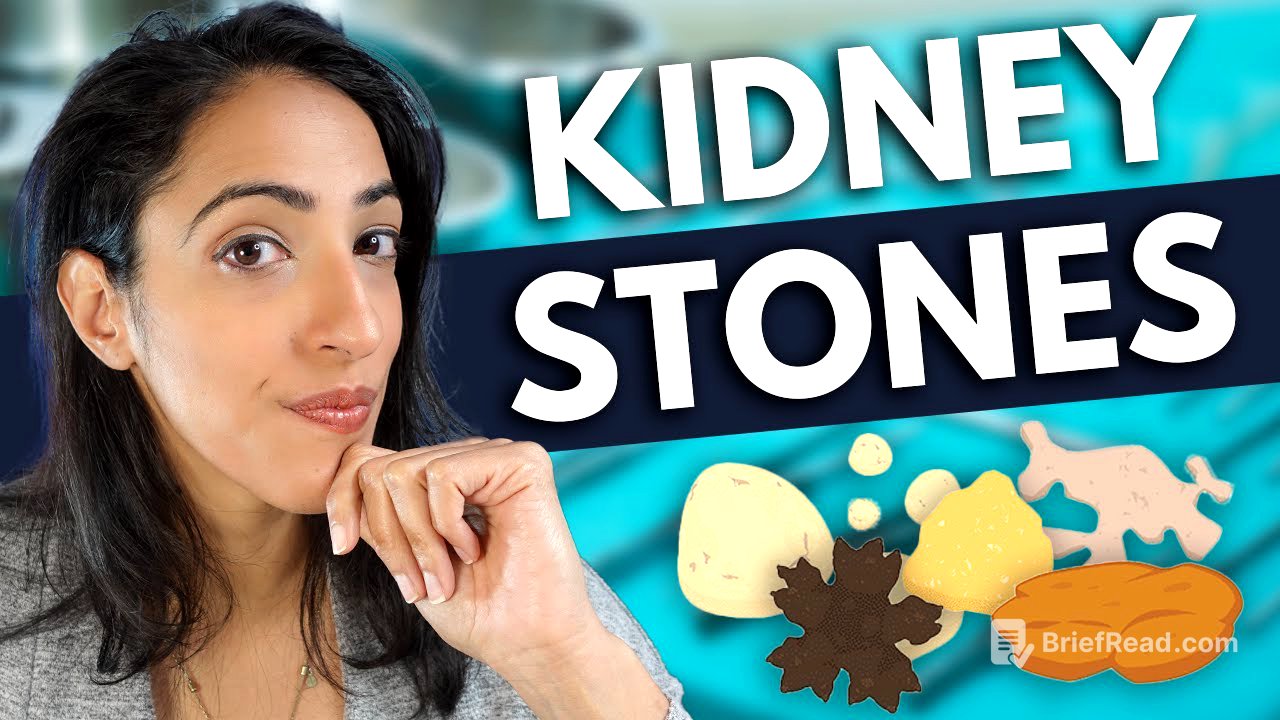TLDR;
This video by Dr. Rena Malik provides a comprehensive overview of kidney stones, covering their formation, symptoms, risk factors, appearance, and how long they take to pass. It emphasizes the importance of hydration, dietary adjustments, and medical evaluation for those at risk. The video also discusses various treatment options and lifestyle adjustments to aid in the passage of kidney stones.
- Kidney stones are common, affecting 1 in 11 adults.
- Hydration is crucial in preventing and passing kidney stones.
- Stone size affects the likelihood and duration of passage.
Introduction to Kidney Stones [0:00]
Dr. Rena Malik introduces the topic of kidney stones, highlighting their prevalence and the common desire to understand their causes and how to get rid of them. She mentions that the video will cover the formation, symptoms, appearance, and passage time of kidney stones. She also invites viewers to subscribe to her channel for more content on sexual and urologic health.
Risk Factors for Kidney Stones [0:32]
The video discusses several risk factors associated with kidney stone formation. Metabolic abnormalities that affect how kidneys process urine, leading to imbalances in volume and acidity, can increase the risk. Low urine volume due to insufficient fluid intake is a significant risk factor, with the American Urologic Association recommending at least 2.5 liters of fluid daily for stone formers. Dietary factors such as high salt intake, high animal protein consumption, and high oxalate intake from foods like spinach and nuts also contribute to the risk. Environmental factors like living in hot climates or working in high-heat environments can cause dehydration and increase the likelihood of stone formation. Obesity, hypertension, diabetes, and cholesterol issues are also mentioned as conditions that can alter urine pH and increase risk. Additionally, bowel diseases, a personal or family history of kidney stones, and certain medications are identified as potential risk factors.
Symptoms of Kidney Stones [4:37]
The video explains that some kidney stones may not cause any symptoms while they remain in the kidney. Pain typically occurs when a stone moves into the ureter, often getting stuck at the ureteral pelvic junction, where the ureter crosses the iliac vessels, or at the ureteral vesicle junction. This blockage can cause pain in the flank, upper back, belly, or even groin. The referred pain in the testicles can occur in men due to shared nerve pathways. Other symptoms include urinary tract infection (UTI) symptoms like blood in the urine, pain during urination, and increased urinary frequency or urgency, especially as the stone nears the bladder.
Appearance of Kidney Stones [6:26]
Kidney stones vary in appearance depending on their composition, with calcium being the most common component. Other types include uric acid stones and cystine stones. The video notes that the appearance can differ significantly based on the stone's specific makeup. Asymptomatic stones may not always require immediate intervention, as only a small percentage of individuals with asymptomatic stones develop symptoms or require procedures within three years. However, these stones can increase the risk of recurrent UTIs, necessitating monitoring by a urologist.
How Long Does It Take to Pass a Kidney Stone? [7:33]
The time it takes to pass a kidney stone depends on its size. Stones 2mm or less take about 8 days on average to pass, but can take up to a month. Stones between 2-4mm take about 12 days on average, but can also take up to 40 days. Stones larger than 4mm can take an average of 22 days to pass, but may also require up to 40 days. About half of those with stones larger than 4mm require a procedure for removal. To aid in the passage of kidney stones, drinking plenty of fluids is crucial. Non-steroidal anti-inflammatory drugs (NSAIDs) like Motrin or Aleve can help by relaxing the smooth muscles of the ureter. Tamsulosin, typically used for enlarged prostates, can also assist. Additionally, sexual intercourse may help due to the release of nitric oxide, which acts as a smooth muscle relaxant.
Conclusion [9:41]
Dr. Malik encourages viewers to leave comments with specific questions about kidney stones or other urologic conditions. She concludes by reminding everyone to prioritize self-care.









